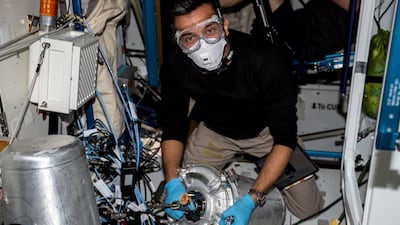UAE astronaut Sultan Al Neyadi is taking part in research designed to make long-term missions in deep space possible.
Dr Al Neyadi, along with his Nasa colleague Stephen Bowen, retrieved hardware from the airlock of a Japanese module on the International Space Station that was exposed to microgravity.
The Materials International Space Station Experiment, or Misse, helps test different spacecraft hardware materials that could be used in future long-duration space missions, especially as space agencies look to send humans to Moon and then eventually to Mars.
“Bowen joined UAE astronaut Sultan Al Neyadi and retrieved physics research hardware from inside Kibo’s airlock,” Nasa said. “The space physics gear, containing a variety of materials, had been placed outside the station and exposed to the harsh vacuum of space.
“Misse enables government and private sectors to study how extreme temperatures, radiation and micrometeoroids affect materials, coatings and components.
“Results may improve the design of space hardware promoting long-term mission success.”
The Emirati astronaut arrived on the orbiting science laboratory on March 3. He will be supporting his American colleagues with more than 200 experiments and will be carrying out 19 others assigned to him by UAE universities.
Another of his recent science investigations involved testing technology in space that 3D-prints knee cartilage tissue.
Called the BioFabrication Facility, the portable equipment could one day allow doctors to treat injuries in space and remote locations on Earth.
Last week, Dr Al Neyadi installed a tissue cassette with knee meniscus cells into the facility to see how it worked.
Astronauts have been carrying out science work on the station since it became operational more than 20 years ago.
The experiments have helped improve daily life on Earth, from vaccine development and purifying water to improving baby formulas.
Dr Al Neyadi will be spending the coming days preparing for the first spacewalk performed by an Arab astronaut.
On April 28, he will venture outside of the ISS with Mr Bowen for a six-and-a-half-hour assignment, in which they must replace communication hardware placed on the station's exterior.
This will be the first time an astronaut from a non-ISS partner country has performed an extravehicular activity.
Being chosen as the first Arab astronaut to undertake a spacewalk alongside Mr Bowen “is a great honour and responsibility”, Dr Al Neyadi tweeted last week.
“I am eagerly awaiting this historic moment, for which I have trained extensively at the Johnson Space Centre.
“I am looking forward to represent my country and continue the exceptional journey started by generations of astronauts before me.”
















